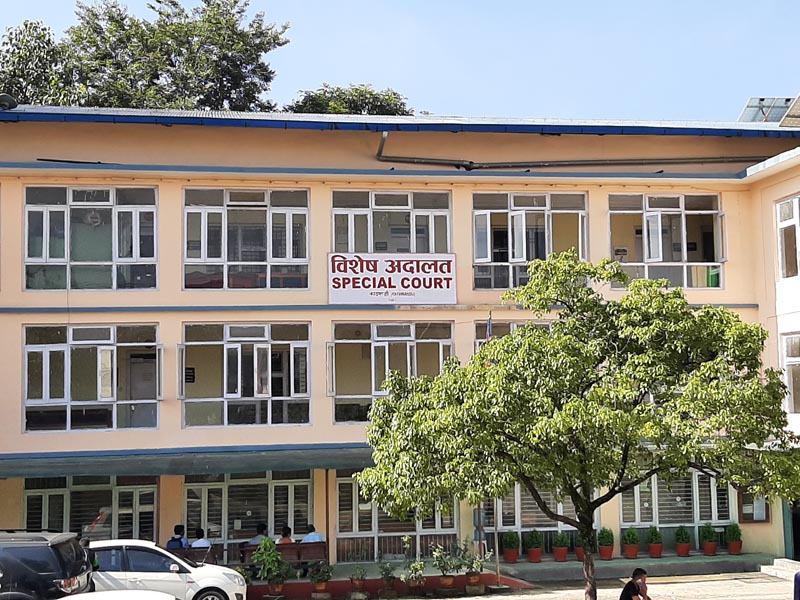Special Court gives clean chit to Tilak Rawal, Paudyal and Himalaya Pande
KATHMANDU, JULY 16
The Special Court acquitted all three defendants in the polymer note case — former governor of Nepal Rastra Bank Tilak Rawal, former chief of Currency Department Upendra Keshari Paudyal and Nepal agent of Note Printing Australia Himalaya Bahadur Pande of corruption charges citing lack of evidence against them.
The Commission for the Investigation of Abuse of Authority had filed a graft case against Rawal, Paudel and Pande at the Special Court on 20 December 2018 accusing them of financial misappropriation in the printing of 50 million pieces of Rs 10 polymer banknotes.
According to Spokesperson for the Special Court Pushpa Raj Panday, the bench acquitted the defendants concluding that the charges against them were based merely on suspicion.
Panday said the court also ruled that the contents of the emails exchanged between some people that the CIAA had based its accusations on, had not been probed and even the contents of those emails were not clear.
Rawal told THT that the court finally delivered justice to him but he had to go through an agonising period of 18 months proving his case. He said the CIAA resorted to bizarre arguments to indict him and two other defendants three days after the Australian High Court dismissed the case against all employees of Note Printing Australia, who had been charged with wrongdoing in the polymer note deal.
Rawal said he had done nothing wrong in the polymer note deal and the CIAA had already decided to keep the case pending due to lack of evidence, but the anti-graft body reopened the case without any new evidence just to torment them. He said former ambassador of Australia to Nepal Susan Grace had pressured the government authorities and political leaders to investigate the case. “We had sealed the contract with Note Printing Australia following all the due processes and even getting the Cabinet nod for the deal,” Rawal said and added that the CIAA’s indictment against only three persons, and not other persons of the Steering Committee, Tender Committee and Cabinet members proved it was a witchhunt against him and two other defendants.
Rawal’s lawyers had argued that the CIAA had based its charges against the defendants on the basis of emails exchanged between employees of Note Printing Australia and that could not be termed valid evidence as the Nepalese authorities had not followed due process mandated by the Mutual Legal Assistance Act to obtain evidence from Australia.
They further argued that none of the emails exchanged among employees of Note Printing Australia were exchanged with Rawal, Paudyal and Pande. Lawyers also argued that all the emails that Rawal and Paudyal exchanged with foreign companies were only about the contract process and there was no wrongdoing.
His lawyers also pleaded before the court that a slight hike of price that Note Printing Australia had proposed was justified because the proposal was made after two years and only for 10 million pieces of polymer notes, which the company was supposed to supply immediately through fast mode of transport to make those notes available in Nepal for the Dashain festival, which was round the corner.
Pande said the former ambassador of Australia to Nepal had visited government authorities in 2011 and pressured them to launch an investigation into the case as the Australian federal police had arrested some employees of Note Printing Australia.
Pande said that in 2011, Australian Ambassador to Nepal Susan Grace had requested the Australian Federal Police, who were based in Bangladesh, to visit Kathmandu with all the relevant documents. She had visited the Ministry of Foreign Office, Nepal Police, the CIAA and PAC of Nepal. She pleaded with the Nepalese authorities to conduct a full-fledged investigation into the bribery case. She told authorities that Australian police had arrested a few employees of Note Printing Australia and officials in Malaysia, Vietnam and Indonesia were also under investigation and hence Nepal should also investigate NRB officials.
“This is a clear case of how foreign embassies bully Nepalese government authorities. If there were any abnormalities in the contract, Ambassador Grace should have handed over the relevant documents to Nepalese authorities, but she overstepped her authority,” he added.
“I think some government authorities wanted to lead a witch-hunt against Rawal and that was how we got entangled in the case,” Pande added.
The CIAA had said the defendants had indulged in under-the-table transactions with local agents in Australia and printed low quality notes.
The anti-graft body had sought to recoup Rs 9.10 million each from Rawal, Paudel and Pande.
The acquittal verdict was delivered by a bench of the Chairperson of the Special Court Shivraj Adhikari and Judges Shanti Singh Thapa and Chandra Bahadur Saru.
A version of this article appears in e-paper on July 17, 2020, of The Himalayan Times.






